The many faces of Christmas
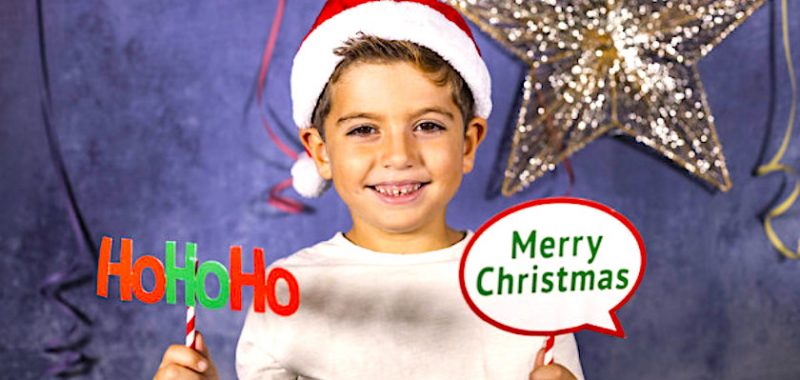
There is no denying it, Christmas is one of the happiest times of the year. It’s magical; the idea that a man, travelling around the world in one night, can deliver presents to everyone!
Excitement, festive activities and a sense of anticipation of what Father Christmas will bring, grips children from all over the UK in the build-up to the big day.
But that’s just how we do it here. Neighbouring countries and other parts of the world do things very differently. And the Sorted team, who all love Christmas and everything it stands for, thought you might like a window into how others will be celebrating the big day come 25 December...
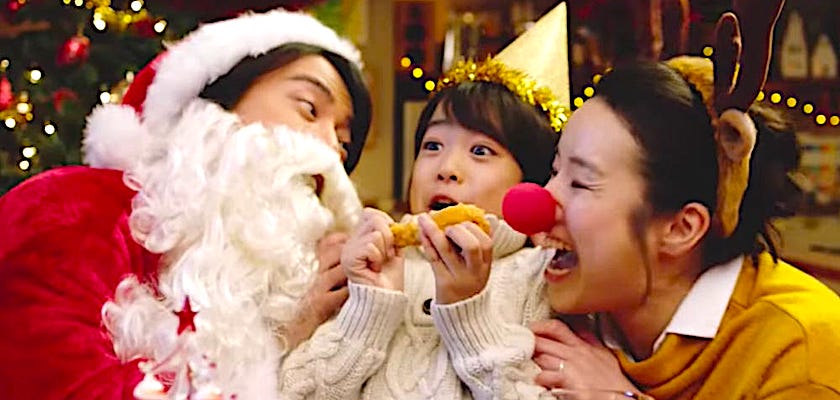 FINGER LICKIN' GOOD: many Japanese people celebrate Christmas by tucking into a KFC!
FINGER LICKIN' GOOD: many Japanese people celebrate Christmas by tucking into a KFC!
JAPAN
Santa Claus is translated in Japanese as Santakukoru, Santa-san, or Santakuroosu.
Merry Christmas is pronounced Meri Kurisumasu.
While Japan mainly follows the Shinto or Buddhist faiths, during the past few decades it has become more susceptive to enjoying the Christmas festivities. Christmas Eve is the day the Japanese celebrate, and children will enjoy the event by playing games, throwing parties, dancing, and of course, giving and receiving gifts just like we do in the UK!
You might be surprised to discover that KFC is actually one of the most popular ways to celebrate Christmas in Japan – yes, you read that correctly. Orders for KFC go through the roof on Christmas day, with more than 3.6 million families reported to tuck into the Colonel's finest fodder.
ITALY
Santa Claus is translated in Italian as Babbo Natale.
Merry Christmas is pronounced Buon Natale.
In Italy, children get to open their presents on Christmas Day – but, unlike their UK counterparts, they get to indulge in more gifts some 12 days later (on 6 January) when La Befana visits and delivers either presents for the good kids or a dreaded bag of coal for the bad ones!
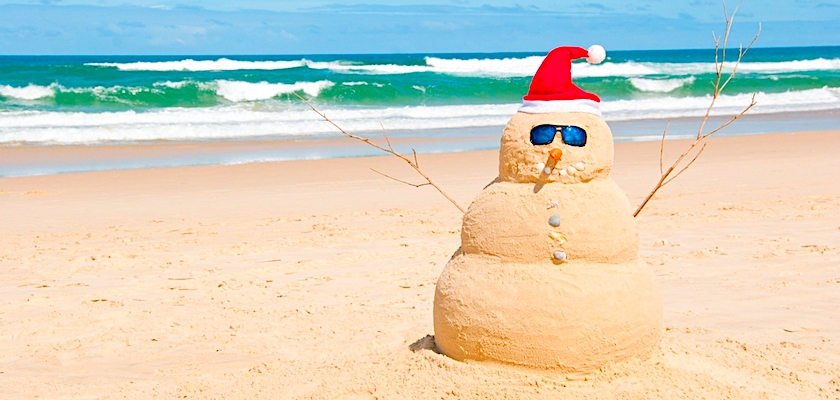 FAIR DINKUM: summer sunshine, surfing and BBQs are the order of the day in Oz.
FAIR DINKUM: summer sunshine, surfing and BBQs are the order of the day in Oz.
AUSTRALIA
Aussie kids are usually blessed with spectacular weather during the festive period, as it's the height of summer. So, swimming, surfing, and snorkelling are everyday occurrences at Christmas – as is a dinner cooked on the BBQ! That said, Australian children mark the event with nativity plays, carol singing, and Christmas tree decorations.
VENEZUELA
Santa Claus is translated in Venezuelan as Papa Noel.
Merry Christmas is pronounced Feliz Navidad.
Venezuela is awash with vibrancy and colour during the Christmas period, with music and lights decorating this stunning country. One of the country's Christmas traditions is unlike any other though – on the morning of 25 December, parents and children from the capital city of Caracas all head to church on their roller-skates! The tradition is encouraged by the local government, who close the streets and roads in order to keep everyone safe.
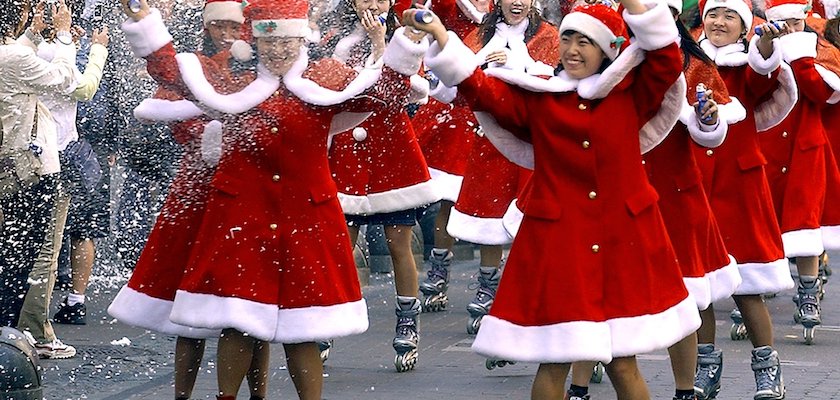 GET YER SKATES ON: Thousands of people living in Caracas go rollerskating on Christmas Day.
GET YER SKATES ON: Thousands of people living in Caracas go rollerskating on Christmas Day.
THE NETHERLANDS
Santa Claus is translated in Dutch as Sinterklaas.
Merry Christmas is pronounced Vrolijk Kersfeest.
Dutch children instead believe that Santa travels by boat from Spain and is helped to complete his deliveries by his trusty assistant, Zwarte Piet. Sinterklass, as he is known, rides a horse and fills the shoes left out by the country's children with treats and goodies. If they have been badly behaved, rather than leaving coals, Zwarte Piet steals them and takes them off to Spain for a year!
Meanwhile, gifts are distributed on either 5 or 6 December.
NORWAY
Santa Claus is translated in Norwegian as Julenissen.
Merry Christmas is pronounced God Jul.
Norwegian kids usually get their presents on Christmas Eve – although only after they’ve finished their evening meal and left porridge out for Julenissen! Throughout November and December, many children celebrate Christmas by carol singing around their neighbourhoods dressed as festive characters and attending various parties at school (these are called Nissesfest).
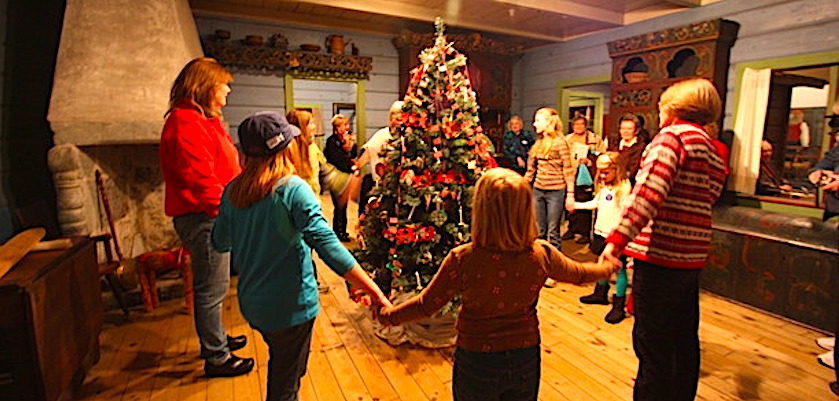 LET'S DANCE: Families in Norway enjoy a more traditional style of Christmas celebration.
LET'S DANCE: Families in Norway enjoy a more traditional style of Christmas celebration.
GERMANY
Santa Claus is translated in German as Der Weihnachtsmann.
Merry Christmas is pronounced Fröhliche Weihnachten.
German children often don’t see Christmas trees lit up in their homes until 24 December. But other festive celebrations do get underway much earlier. They erect huge Christmas trees in town centres from the beginning of the month, while many cities are packed with Christmas markets selling traditional festive foods such as stollen, gingerbread, and sweet roasted almonds. Germany is also famous for creating beautiful glass baubles, which children hang on their trees at home on Christmas Eve.
So, there you have it. It's just a snapshot into the Christmases many millions of children will enjoy in a few days' time – and what differences there are. Yet many are bonded together by one of the two most significant events in the history of the world: the birth of Jesus Christ.
We'll tell you about the other event of huge significance to us all in a few weeks. Can you guess what it is?
